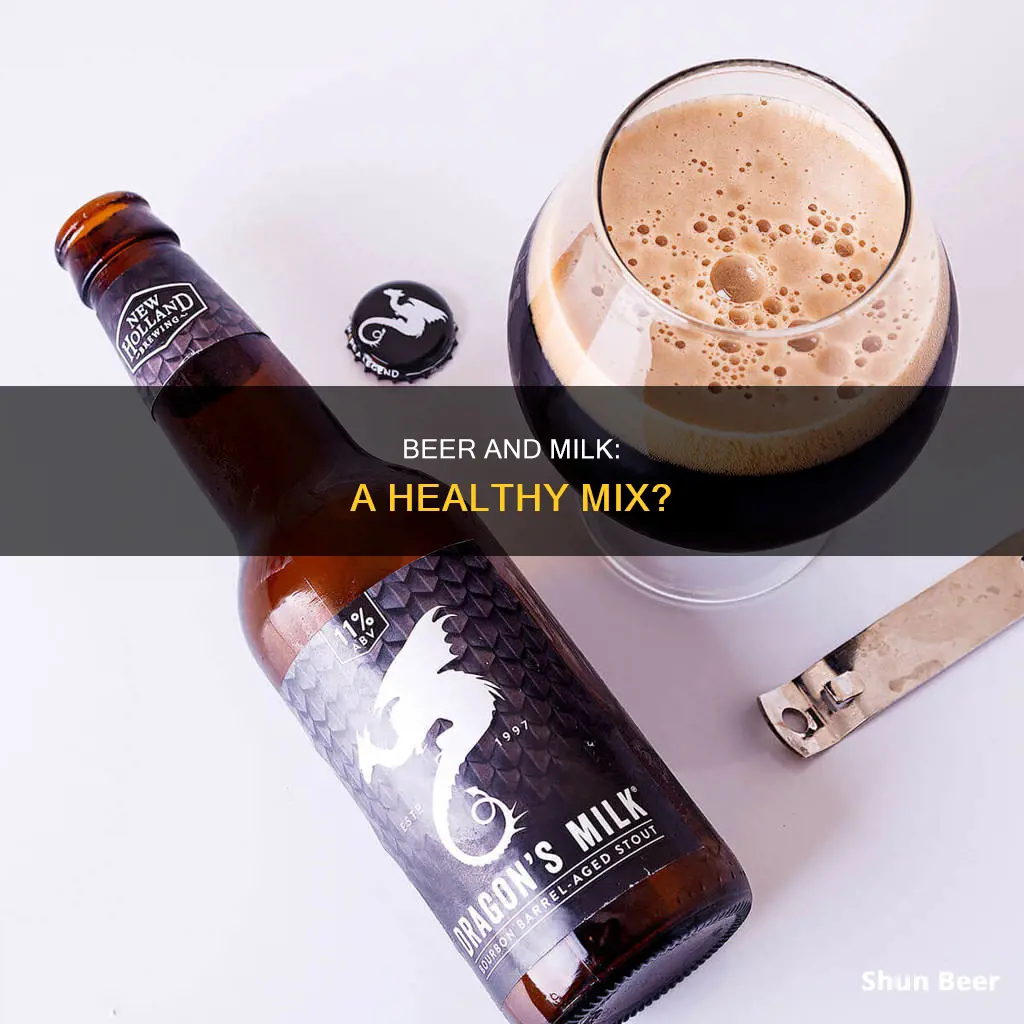
Mixing beer and milk is a topic that has been widely discussed and debated. While some people find the combination of beer and milk pleasant, especially in cocktails like beer nog or a Guinness milkshake, others find it unappealing. Beer can cause milk to curdle due to its acidity, which affects the protein structures in milk. This can also happen in the stomach, as the stomach contains gastric acid. However, milk will curdle in the stomach regardless of beer intake due to the presence of stomach acid. While drinking milk after beer may not cause severe adverse reactions, it can lead to minor digestive discomfort for some individuals due to the contrasting effects of alcohol and dairy on the digestive system.
| Characteristics | Values |
|---|---|
| Mixing milk and beer | Beer and milk don't mix well together |
| A Japanese beer company tried to launch a product called Bilk, which was a combination of beer and 30% milk, but it was unsuccessful | |
| Milk is comprised of proteins (called casein), fats and lactose that float, evenly dispersed, in water | |
| The fat in milk coats the casein molecules, making them less susceptible to curdling | |
| The higher the fat content in the milk, the less likely it is to curdle | |
| Beer is acidic, with a pH level in the range of 4.1 to 4.6 | |
| The acidity in beer can cause milk to curdle | |
| Drinking milk before alcohol | It is believed that drinking milk before alcohol can help prevent a hangover |
| Drinking milk before alcohol can help to slow down the absorption of alcohol | |
| Drinking milk before alcohol can help to line the stomach | |
| Drinking milk after alcohol | Alcohol impairs the absorption of nutrients in milk |
| Alcohol increases acid in the stomach, which can result in gastritis or stomach or intestinal ulcers | |
| Milk can be nourishing and help with sleep after drinking alcohol |
What You'll Learn

Drinking milk before alcohol may help prevent a hangover
While drinking a glass of milk before consuming alcohol may not be harmful, there is little scientific evidence to support the idea that it will prevent a hangover. However, there are a few ways in which milk may help alleviate the symptoms of intoxication and reduce the effects of alcohol.
Firstly, milk contains mineral-rich water, which can help to counteract dehydration caused by excessive drinking. Dehydration is a major contributor to hangover symptoms, so staying hydrated is crucial. Additionally, milk contains whey and casein, which can bind to metals and aid in eliminating them from the body.
Secondly, the proteins and fats in milk can slow down the digestive process, potentially delaying the absorption of alcohol into the bloodstream. This concept, known as "lining the stomach," suggests that milk creates a protective layer in the stomach, acting as a buffer between the alcohol and the stomach lining. However, it is important to note that alcohol absorption primarily occurs in the small intestine, not the stomach, so the impact of milk on alcohol absorption may be limited.
Furthermore, drinking milk before consuming alcohol may help to mitigate the dehydrating effects of alcohol. Milk consists of 87% water, contributing to hydration and potentially reducing the risk of dehydration-related hangover symptoms.
While the effectiveness of milk in curing hangovers requires further study, it is clear that milk can provide some benefits when consumed before alcohol. However, it is important to remember that the most effective way to prevent a hangover is to drink in moderation, stay hydrated, and follow official guidelines on alcohol consumption.
Anesthesia and Alcohol: Safe to Drink Beer Post-Procedure?
You may want to see also

Beer and milk don't mix well, but they won't curdle
The Japanese beer company that introduced "Bilk", a combination of beer and 30% milk, in 2007, found that the product did not curdle. However, it was not well-received by consumers and is no longer available. Beer and milk can be combined in cocktails, such as beer nog, or in milkshakes, like a Guinness milkshake.
The reason milk sometimes curdles when mixed with an acidic solution like lemon juice or beer is due to the structure of the milk. Milk is made up of proteins called casein, fats, and lactose, which float freely in water in small groups called micelles. These micelles have a negative charge that prevents them from grouping together and keeps the milk liquid. When an acidic solution is added, it neutralizes the negative charge on the casein micelles, causing them to clump together and form lumps.
The pH level of most beers falls between 4.1 and 4.6, which is considered acidic. As beer ages, it can lose some of its acidity, but issues during the brewing process, such as acid-producing bacteria, can further lower the pH level. The acidity in beer can cause milk to curdle, but it is not a guarantee. The likelihood of curdling also depends on factors such as the age of the milk and the type of milk used.
Beer After Best Before Date: Is It Safe to Drink?
You may want to see also

Milk can help settle your stomach after drinking alcohol
There is a common belief that drinking a glass of milk before consuming alcohol can help to reduce the effects of alcohol by "lining your stomach". However, biologically, the concept of "lining your stomach" does not exist. While drinking milk before drinking alcohol will not prevent you from getting drunk, it can help in other ways.
Firstly, drinking milk before alcohol can help slow down the absorption of alcohol into the bloodstream, although only modestly. This is because around 20% of alcohol is absorbed in the stomach, and the rest is absorbed in the intestine. Therefore, consuming milk or food before drinking alcohol can delay stomach emptying, which can slightly slow down alcohol absorption.
Secondly, milk can help settle your stomach after drinking alcohol. Alcohol increases acid in the stomach, which can lead to gastritis or stomach and intestinal ulcers. Drinking milk, especially if it is warmed and flavoured with ginger root, can nourish the body, calm the mind, and aid sleep. This is because milk contains the amino acid L-tryptophan, which helps the body produce neurotransmitters such as serotonin, telling our bodies to shut down at night.
In summary, while drinking milk before alcohol will not significantly reduce the effects of alcohol, it can help to slightly slow down alcohol absorption and reduce its negative impact on the stomach. Additionally, milk can promote better sleep and help the body recover after a night of drinking.
Beer and Buspirone: Is It Safe to Mix?
You may want to see also

Alcohol impairs the absorption of nutrients in milk
Alcohol abuse creates an internal environment that predisposes individuals to malnutrition. Alcohol is a toxin that must be processed by the digestive system, which creates competition for limited nutritional resources that would otherwise nourish the body.
Alcohol inhibits the absorption and storage of vitamins B12, folacin, and vitamin A. It also uses up niacin, thiamine (vitamin B1), and other B vitamins during metabolism in the liver, making these vitamins unavailable for other essential purposes.
Alcohol also increases acid secretion by the stomach, which can injure the lining of the small intestine and further interfere with the absorption of vital nutrients.
Chronic heavy drinkers are hit with a double health whammy—they don't consume enough nutrients, and the nutrients they do consume are not utilized well due to alcohol's damaging effects on the body's ability to absorb and process nutrients.
Beer After a Workout: Good or Bad Idea?
You may want to see also

Drinking milk after alcohol may worsen acid reflux
Drinking milk after alcohol consumption may worsen acid reflux. Acid reflux, or heartburn, occurs when stomach acid flows back up into a person's oesophagus. This can cause an uncomfortable burning sensation in the throat and chest. While dairy is not among the recognised causes of acid reflux, some people may experience this when consuming milk or other dairy products.
High-fat dairy products, such as whole milk and yoghurt, can relax the lower oesophageal sphincter, which is responsible for keeping stomach contents from rising into the oesophagus. When this muscle weakens, food and stomach acid can travel back up the food pipe, causing heartburn. Alcohol can also relax this muscle, increasing the risk of acid reflux.
Alcohol further impairs the absorption of nutrients by damaging the cells lining the stomach and intestines, and altering the transport, storage and excretion of nutrients. This can lead to nutritional deficiencies and associated health problems.
To reduce the risk of acid reflux, it is recommended to avoid high-fat dairy products and opt for lower-fat alternatives. Plant-based milk, such as almond milk, is also a good option as it is alkaline and can help neutralise stomach acid. Additionally, avoiding alcohol and other trigger beverages, such as carbonated drinks and coffee, can help prevent acid reflux.
Beer and Fun: Chuck E. Cheese, Atlanta Style!
You may want to see also
Frequently asked questions
Yes, you can drink milk and beer at the same time, but it is not recommended due to the potential health risks. Beer is acidic and milk contains proteins called casein. When mixed, the milk may curdle, and the combination may irritate your digestive system, causing stomach irritation, nausea, and bloating.
Drinking milk after beer is not recommended as it can cause similar issues to drinking them together. Beer disrupts the digestive process, and when milk is consumed after beer, it may be more difficult for your body to absorb the milk, potentially leading to diarrhea.
Yes, you can drink beer after drinking milk. However, it is important to note that drinking beer in excess or on an empty stomach can cause nausea, heartburn, and other gastrointestinal issues.
Drinking milk before drinking beer is generally safe and may be preferable to drinking them together or drinking milk after beer. Milk will be digested normally, and the potential side effects of drinking milk after beer are avoided.







